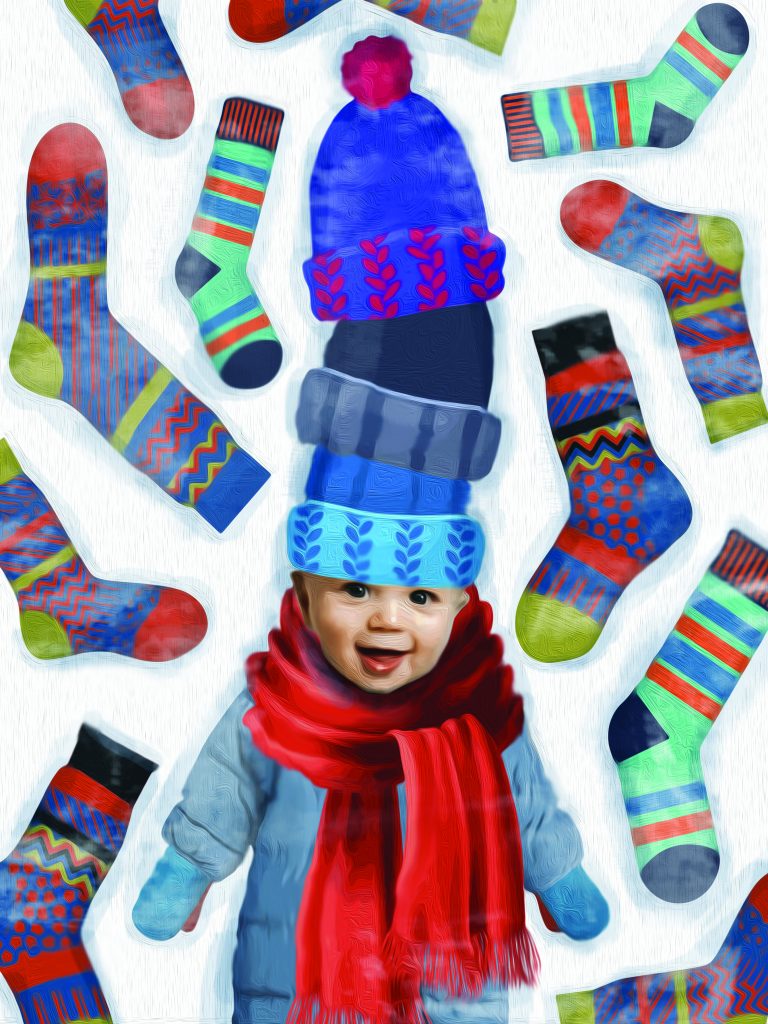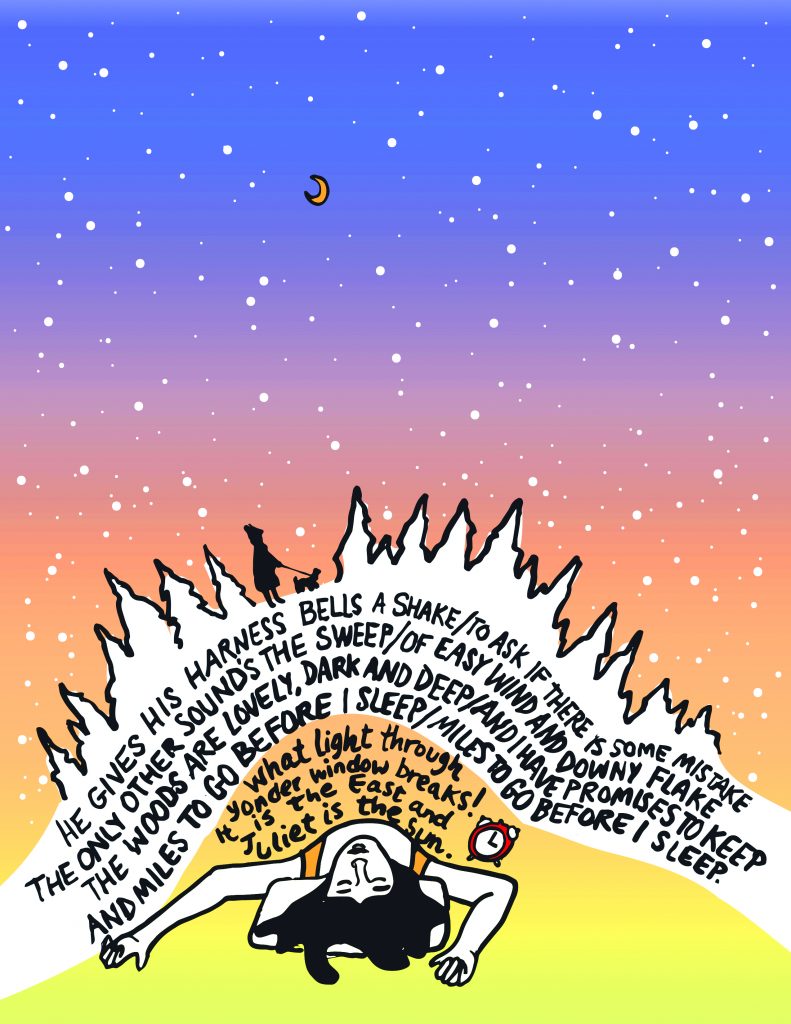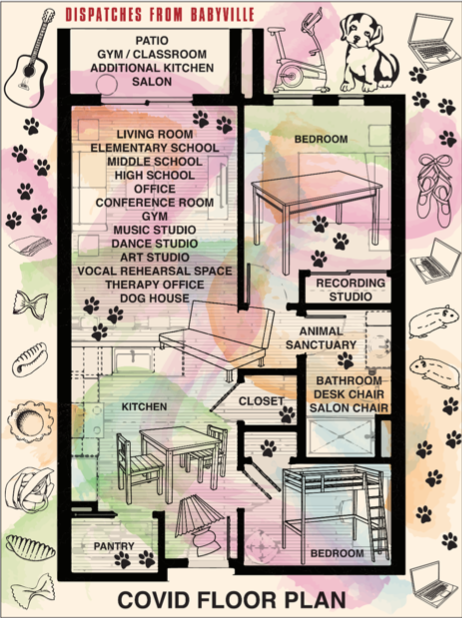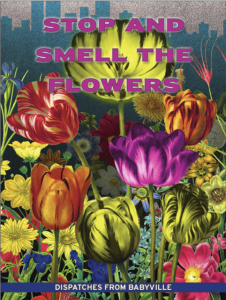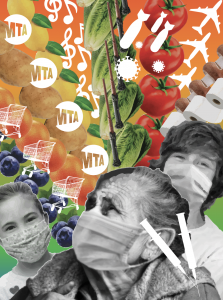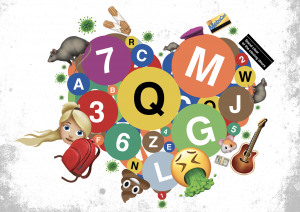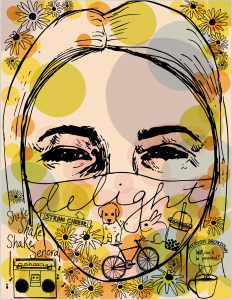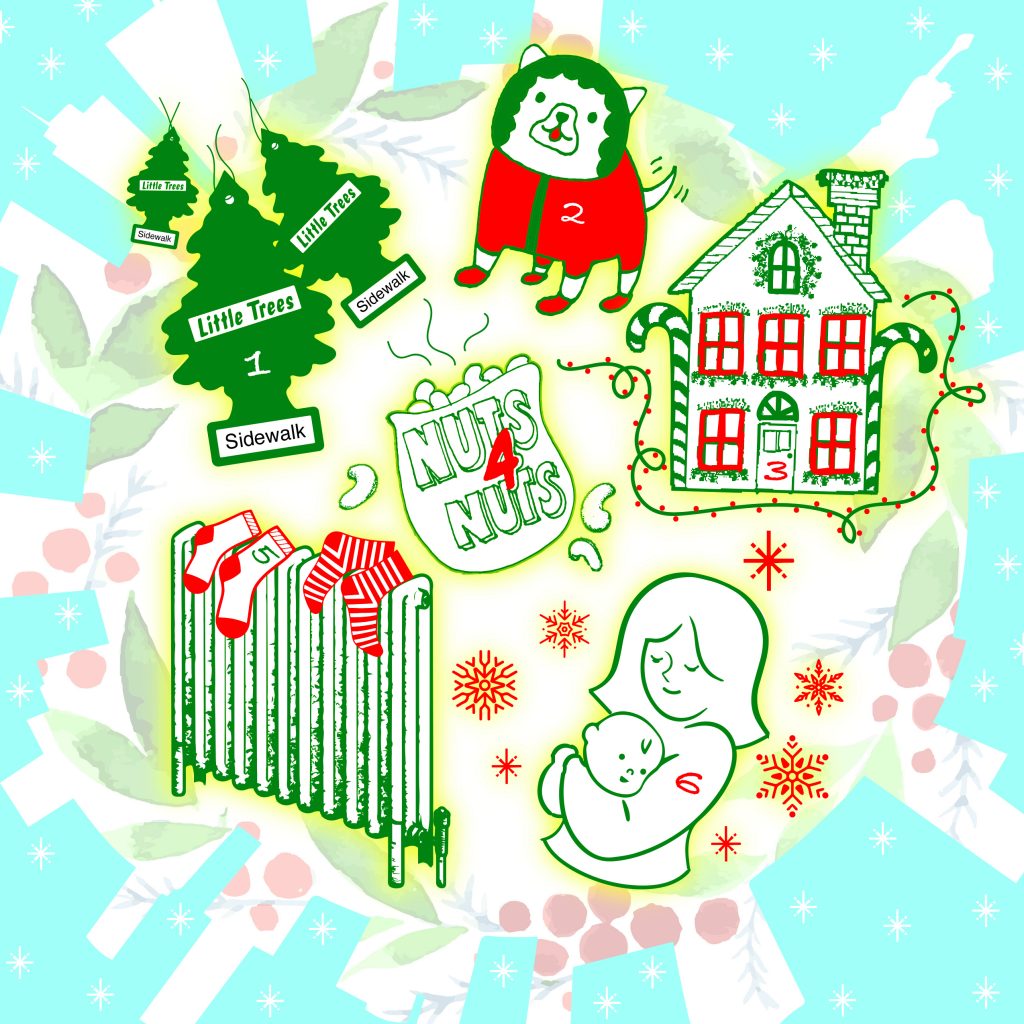
Every year, sometime between New Year’s and Valentine’s Day, I announce to my family, “Now is the winter of our discontent!” Which is another way of saying, winter in the city has more than its fair share of miseries.
What is sometimes more difficult to recall, as the salt-white snow turns pepper- black and the wind chill becomes positively punitive, is that winter in the city has plenty of delights too, many of them unexpected. Here are a few of my favorite:
- The Smell of Overpriced Sidewalk Christmas Trees
There’s not enough room on a Brooklyn sidewalk under normal circumstances, and even less during the month between Thanksgiving and Christmas, when sidewalk Christmas tree sellers set up shop. I’m not sure who has the disposable income to afford one of these very costly, usually haggard Douglas Firs or Blue Spruces, but the beauty part is this: the smell of the pine needles that fills your nostrils as you walk by is one hundred percent free.
- Little Dogs in Their Finest Winter Fashion
Is there anything more delightful than a tiny quadruped in a Canada Goose down jacket? With a hood that has ear-holes cut out? And matching booties on petite puppy paws? Even the most cold-hearted curmudgeon, the Grinch-iest of Grinches, will melt a little at the sight of such wildly unnecessary adorableness.
- The Over-the-Top Decorations of (the area adjacent to) Dyker Heights Lights
I grew up right near Dyker Heights and every year when I was a kid, my parents would drive us down 84th Street to marvel at the over-the-top decorations: the houses so blitzkrieg-ed with lights you could spot them from Mars, the life-size Nutcrackers, the Santa Clauses posing for pictures. It was an easy thing to enjoy—just hop in the car and go for a ride.
A year or two ago, after feasting on Spumoni Gardens pizza with my kids, I had a hankering to show them the lights I so enjoyed in my youth. After all, it was the weekend before Christmas and we were already in the car, so close by. I called my mother and asked her what street we should drive down.
“Are you nuts?” she asked with a cackle. “You can’t drive down those streets anymore! You’ve gotta park and walk—and you’ll never find a parking spot! Traffic’ll be worse than the Five Borough Bike Race day! Forget it!”
I did not listen to my mother, clinging instead to the belief that a magical Christmas moment was within reach.
After spending the better part of an hour in bumper-to-bumper traffic on 15th Avenue, at least half a mile from the place where magical Christmas moments happen, my children revolted.
“This is taking too long! I want to go home!” my littlest one, known in these parts as Terza, yelled. “I don’t want to see any of the dumb lights!”
“She’s right,” my middle daughter, Seconda, chimed in. “This is totally not worth it.”
“But the life-sized Nutcrackers!” I pleaded.
“Look.” David pointed to a house across the street. “That house is decorated. That’s probably part of it.”
The house in question was strung with a decidedly average amount of decidedly average lights. A few strings were corkscrewed around the banisters and another paltry few lined the perimeter of the windows. This, it was abundantly clear, was not the Dyker Heights Lights. On the scale of holiday decorations, it barely registered as festive.
“Oooh!” cooed Seconda, not so much believing her father as wanting to prove we’d gotten what we came for, and thus could leave. “It’s so pretty!”
“But that’s not them,” I insisted. “We’re not even close.”
“There’s another one!” David gestured at a house down the street to our left. This one had a Ho Ho Ho! sign buzzing in red neon over the doorway and some lights half-heartedly tossed over a tree out front.
“Wow!” Terza gushed, following her big sister’s lead. “That is so cool!”
“These are not the real ones!” I insisted. “These are not the real Dyker Heights Lights!”
“Well, they’re not imaginary,” my teenage son, Primo, shot back. “So they must be real.”
The kids fake oohed and aahed as our car crawled down the avenue and I protested, “But those aren’t the real ones . . . not the real ones,“ until at the very first opportunity, David turned left, and hightailed it away from Dyker Heights.
The moral of the story? Listen to your mother.
- The Smell of Hot Nuts on a Cold Day
You emerge from the bowels of the earth, otherwise known as a New York City subway station. Maybe it’s 57th Street. Maybe it’s Union Square. The snap of cold hits you first — your nose, your fingers. You zip up your jacket. You pull up your hood. You watch as your hot breath makes clouds of steam in the air. Maybe a stranger knocks shoulders with you as they rush by. Maybe you step on a half-frozen dog turd. And you think: Why? Why do I stubbornly continue to live here? Where sidewalk Christmas trees cost a not-so-small-fortune and the fun that is free, like Dyker Heights Lights, is so overrun with crowds that I can’t access it without a ten step plan? I could live in Florida! Where the politics are abhorrent but high-speed-internet costs $7 for the whole month! And your hair never, ever freezes!
And then the aroma of something being roasted reaches you. You don’t know if you can smell the salt or simply remember the taste of it. Just one whiff warms you. Let the snowbirds have Florida, you think. You have hot nuts on a cold day.
- Warming Wet Socks on the Radiator
Page 25. The Snowy Day, by Ezra Jack Keats.
“He told his mother all about his adventures while she took off his wet socks.”
If there’s a more perfect sentence in all of children’s literature, I don’t know what it is. It calls to mind countless afternoons spent in my grandmother’s second-story apartment in Bensonhurst, and her peeling off my sodden socks and placing them on an ancient radiator which rattled underneath the window. When I had children, I transformed from the sock-wearer to the sock-remover, and I smoothed my kids’ hosiery over the grates of our own radiator, smaller than my grandmother’s but just as ancient. The distinctive smell of wet wool being warmed is the smell of care-taking, of tender, maternal affection. It’s the smell of childhood winters — for me and for Keats too, I‘m guessing.
6. The Quiet of the First Snow
The city that never sleeps is, unsurprisingly, never quiet. Except for when it snows.
When my oldest child, Primo, was a newborn, David took endless videos of the baby. Occasionally I’d make an appearance in these. Among these cherished videos, there is one I treasure above all others.
In the video, there’s a very young-looking mother that I can hardly recognize as myself and a two-month-old baby who I’d recognize anywhere as my son. We’re in the middle of the first snowfall of the season, which also happens to be the first snowfall of Primo’s life. I’m sitting on the radiator under my bedroom window, the baby on my lap, both of us peering out onto Carroll Street, which is being blanketed by snow.
David points the camera out of the window, down onto the street, which is made magical, new, by the snow. Everywhere, everything is silent. The only sound is my murmuring as I talk to the baby, naming the snow, and the cars, and the window. Then David turns the camera back to us. The baby is watching the world out the window, as I watch the baby, and the look of wonderment on my son’s face is rivaled only by the look of wonderment on mine.
There are so many moments in motherhood you anticipate, all the milestones you expect will be joyful—and sometimes they are, and sometimes they’re not. But always there are the unanticipated moments of delight, of marvel, or awe, and this was one I’ll never forget. The quiet of my first baby’s first snowfall.

